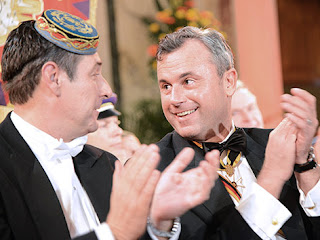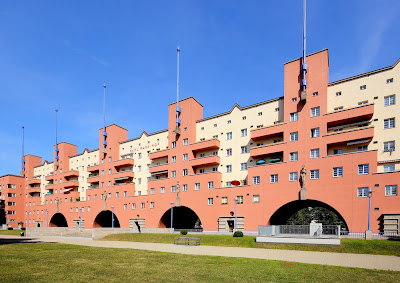Angela Merkel was sworn into office as German Chancellor for the first time on precisely this date, November 22nd, in 2005, eleven years ago. On Sunday (November 20th) she announced her candidacy at the next parliamentary elections in Germany, well ahead of her initial intention to wait until January. The election is due to take place in approximately ten months from now, most likely in late September or early October, 2017. The current “political climate“ in Germany seems to be that there is no alternative to her continuing on after the next election. Yet, there is.
Just three days prior to that, at Thursday's (November 17th) press conference with US president, Barack Obama, in Berlin, at the occasion of Obama's last state visit to Germany, she had evaded clear answers to questions about her own future beyond 2017 and had urged everyone to wait until the beginning of the election year itself. A couple of minutes later, she also stated „Demokratie lebt vom Wechsel - democracy is kept alive by change“. This was, of course, in reference to the current transition from the incumbent president Obama to president-elect Trump in the U.S., but it could also have been a hint at her own future. Yet, in hindsight, and in line with the decision she announced just a few days later, it turned out not to be, or in other words, to merely be a diplomatic phrase. The current “political climate“ in Germany seems to be that there is no alternative to Merkel (aged 62) continuing on after the next election, thus extending her tenure to over twelve years, and to fifteen years if she would stay on for the entire next four-year term. Thus she would, in late 2019, be overtaking the famous first post-war Chancellor Konrad Adenauer (fourteen years, 1949-1963) and, at the end of the said term, in 2021, be just short of the sixteen years her mentor in the 1990s, Helmut Kohl, was in office (1982-1998; both Adenauer and Kohl also representing her own party, the conservative Christian Democratic Union (CDU)).
Yet, within the last couple of months, meetings have taken place of some members of the Social Democratic Party (SPD), the Greens (bourgeois centre-left), and the democratic socialist Left Party (Die Linke), in order to (tentatively) make preparations for a possible alternative centre-left coalition to replace Merkel's Grand Coalition (formed by her own Conservative fraction (made up of the CDU and the - more conservative - Bavarian sister party CSU) and the SPD) a year from now. For this to be possible, the SPD would have to modify its current profile the most, by moving left again, away from current centrist or even centre-right positions on most issues, that the party took to be able to govern together with Merkel; but this seems in the realm of the possible in light of the (by German standards) still rather early pre-election stages we're currently in (usually the main campaigning doesn't really kick off before the end of the winter, so about five months ahead of the election date).
Latest polls (if we can still “trust“ any of them after the failures of the pollsters in the UK and the US this year) suggest that a “Red-Red-Green“ coalition is just short of the 50% mark and thus a majority in parliament; but it could gain more dynamics if, from the coming spring at the latest, it presents itself as a viable left-wing alternative to Merkel's current centre to centre-right policies - as, with the exception of the refugee policy (at least prior to the cynical Turkey "refugee deal"), the Grand Coalition is centre-right to hard right on most other issues. This is true especially with regard to fiscal policy, where the mantra of “fiscal responsibility“ or “fiscal conservatism“ has led to austerity, both domestically (German: „schwarze Null“ ("black zero"), i.e. a balanced budget, a no-debt policy, and no Keynesianism, despite Germany's current interest rate for borrowing being negative (!!)) as well as, much more drastically, outside Germany, in the “Euro crisis“ countries. Greece, which was driven into abject poverty, but similarly Portugal and Ireland, and to some extent Italy, were most affected by German-initiated austerity “measures” to “solve” the “Euro crisis” - i.e. socialize the debt by cutting public goods and services, and privatize the profits of banks and corporations (by “bailing them out”).
At the same time, the German government is increasing the military budget, allowing arms exports to autocratic states in the Middle East and elsewhere (most prominently Saudi-Arabia and Oman) and ratifying the notorious transatlantic "free" trade agreements with Canada (CETA) and the US (TTIP), which are opposed by many in the European populace (Berlin saw a demonstration of more than 200 000 against TTIP already in October of 2015). With a centre-left government, a change of direction in this crucial field (national and European economic, fiscal, infrastructure and social policies) can at least be hoped for – a bit “against hope”, of course, as there would be strong resistance to any Keynesianism or any kind of real European "Marshall Plan" by the European and global financial institutions, such as the IMF and some other EU institutions (such as the ECB or the infamously political (neoliberal) European Court of Justice), but still a spark of hope.
 |
| Anti-austerity protest in Athens, Greece, on June 21st, 2015, "ΟΧΙ" στην ΕΞΌΝΤΩΣΗ ("no to annihilation") Source: Wikimedia Commons |










